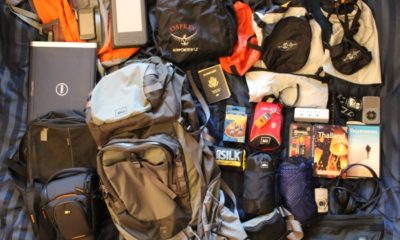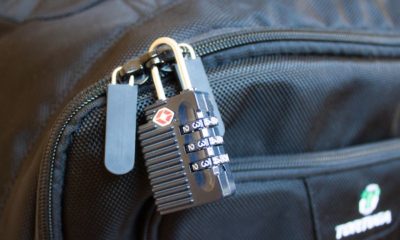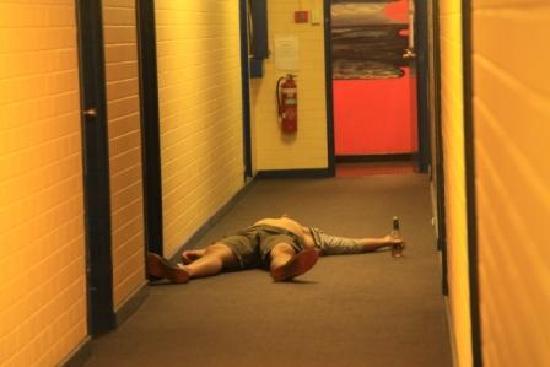Advice
Travelling Vaccinations: Rabies
Do I need a rabies vaccination before going travelling? Surely that has to be one of the biggest questions asked by backpackers pre-departure.
Skip to:
>Should You Get A Pre-exposure Vaccination?
Do I need a rabies vaccination before going travelling? Surely that has to be one of the biggest questions asked by backpackers pre-departure. People are usually in two minds about getting the rabies shots, thinking about the cost and arguing “even if you are vaccinated, you still need to get more injections if you get bitten”. Hopefully this article and my experience will answer this question definitively for you.
Note: read here for more information about General Travel Health and Other Vaccinations
A Bit About Rabies
Rabies is a very serious viral infection that targets the brain and nervous system. It is usually spread through an infected bite, scratch or lick to broken skin from a rabid mammal, most commonly a dog. Very rarely, the disease has been spread through mucous membranes (i.e. nose, eyes, mouth) that have been exposed to infected animal saliva. There is no specific treatment available for rabies once symptoms develop. Death is the usual outcome if infected with the rabies virus.
Rabies is found in all continents of the world except Antarctica. Most human cases of rabies occur in Asia, Africa, and to a lesser extent, Latin America.
 Map courtesy of the World Health Organization (International Travel and Health, 2013).
Map courtesy of the World Health Organization (International Travel and Health, 2013).
It is always advised you seek professional medical advice before travelling through a registered doctor or at least from government run website like NaTHNaC – you can read more about the rabies vaccine on their website.
My Story
I decided against getting the rabies vaccinations before my first ever backpacking trip to South East Asia. Like many others I was put off by the cost, and the fact that even if I was bitten I would still need to receive further injections – plus I really didn’t think I was going to get bitten.
About 2 months into my trip, after a perfect day, I was walking along a road in Koh Phagnan, Thailand back to my hostel. There was a small, yappy dog (similar to a Jack Russell) standing in front of a house. Despite having been in the region for a while, I was still very wary about dogs and kept a wide distance between myself and the dog as I walked past. I walked about 10 yards further up the road and felt a short, sharp pain just above my ankle and looked behind to see the dog starring back and growling at me. The dog was pulled away by the owner’s of the house, they made a quick apology to me and told off the dog, before dragging it into their yard.
I couldn’t see any blood, but at that point my panic stations went into overdrive; *RABIES!* was all I could think. I ran back to my hostel and washed my leg as thoroughly as could with soap, before speaking to the hostel owner. The hostel owner was a laid back Canadian, who to be honest wasn’t a great help, he just said “it’ll be fine bro”, but did tell me there was a roadside clinic down the road.
When I got to the clinic and mentioned a dog bite, the nurses all jumped into action quite seriously, but after seeing the wound they dismissed it – it was only a very small graze – they wiped it with alcohol solution and said I didn’t need any vaccinations. I wasn’t totally convinced, but there didn’t seem to be any blood, the marking went after a few days and there was no scabbing, so I was quite sure no salvia made it into my blood stream.
However about 4 days after the bite, I woke up with a tingling, dare I say biting pain on my lower leg, where the bite took place. I immediately went into panic again; *RABIES!* and did probably the most stupid thing I could have done – Google’d “rabies symptoms”. The first article I came across said: “symptoms can occur as soon as 4 days after the bite, usually beginning with pain around the bitten area”. Of course I read on; “initial symptoms can include, chills, irritability, headache and anxiety”, all of which I had, and then I read the bombshell: “once symptoms develop, the condition is almost always fatal.” Naturally I thought I was going to die.
After calming down a little bit, I decided to go to a more professional clinic to get some reassurance and the post exposure vaccinations. I wanted the doctor to say, “you are just worrying, it is highly unlikely you have rabies”, instead she said straight up “if these symptoms are caused by rabies, the vaccinations won’t do anything”. It seems strange now, but I didn’t tell anyone back home about the bite, nor the people I was travelling with. I couldn’t bring myself to call home and say “Mum, I might die in the next few days”. I wanted to wait and see what happened, again it seems crazy, but I thought if I’m going to die, what is the point in worrying people back home or causing a fuss with the people I was with.
I had already booked a boat to Ko Tao the next day and decided to take it. I spent two days living with the worst anxiety ever as further symptoms, such as diarrhoea, started to develop. I had only booked two nights in my guest house and when I went to extend my stay the owner said all the rooms were booked for the next few nights. I thought just what I need; I am in total disarray and now I need to pack up all my stuff and find somewhere else to stay. The whole island was booked up, I walked around for 2 hours with 15kg on my back looking for a place to stay.
When I eventually found a place, I had my first realisation. Whilst walking around for those 2 hours I had no symptoms; no pain in my leg, no headache, or chills – all I was thinking about was finding a bed for the night – perhaps all these symptoms were to do with anxiety. So I Google’d “anxiety symptoms”, and what would you know, I had literally every symptom on that page including “feelings of panic, problems sleeping, heart palpitations”, but more importantly all the symptoms that I thought were linked to rabies “chills, irritability, headache, diarrhoea” plus “weakness in legs and muscle pains”, which I thought explained the pain in my leg.
I felt a lot better and began to look at things more rationally and realistically. It dawned on me that the pain in my leg might have been related to a small cut on my toe that may have become infected. A few days later I read an article on a government health website that said if the dog was not in a rabid state at the time of the bite, it could not spread the virus. Crucially the article said if the dog was still alive 10 days after the bite, it couldn’t have been in a rabid state at the time of the bite, and therefore no way it could have transmitted the virus. At that point I knew I had to go back to Koh Phagnan to see if the dog was still alive for complete peace of mind, even though it completely messed up my itinerary.
I spent an hour walking up and down the road I had been bitten on in search for the dog, and began to fear it was dead. I decided to stop for lunch and try again. Finally, standing in pretty much the same position as it was on that day, the dog. I have never felt so relieved in my life. Unbelievably, seconds later some puppies gathered around the dog and it laid down to feed them. A perfect explanation as to why the dog bit me in the first place – she was just protecting her puppies and gave me a warning bite to stay away – she was certainly not rabid.
I still finished the post exposure course though, receiving all 5 injections – I didn’t want to go through all that and think “it’s fine now”, then die because I stopped the course! In hindsight I was never in any danger of catching rabies, but the pre-exposure vaccinations would have given me a hell of lot of peace of mind, and saved me from one of the worst experiences of my life.
The lesson to learn from my story is; if in doubt, act immediately, get the post exposure vaccinations as soon as possible – they only cost me £50 in Thailand. If you don’t, any little illness or pain in the next few months or even years, you will be worried is rabies – so just get the vaccinations right away without even thinking.
So, Should You Get A Rabies Vaccination Before Travelling?
I would highly advise getting the pre-exposure rabies vaccinations before travelling if you are going to a high risk area, and especially if you are going to be spending lots of time in rural areas or off the beaten backpacker tracks.
Mostly I would recommend getting them for peace of mind. The injections may cost a bit of money, but that peace of mind is priceless – I would have paid £150 in a flash for all that fear and anxiety to disappear.
Having to get 5 post-exposure shots on specific days is also a bit of pain and does ruin your trip a bit.
If you have never been to a developing country before, you’d be surprised at just how many stray, mangy dogs roam the street. If I had known that before going, I again would have got the jabs before going away.
However, realistically and statistically you are unlikely to be bitten by a rabid animal and even if you are, if you act immediately by washing the wound and getting the post exposure shots, there is a no chance you will develop symptoms.
Reassuring Facts I Wish I’d Known
With the amount of medical journals I read at the time regarding rabies, I became a bit of an expert on the subject. Here are a few things I wish I’d known before:
Fewer than 1% of dogs in South East Asia carry rabies. The majority of rabies cases occur in India, but still only a small percentage of animals are rabid.
Thailand is one of the best places in the world to be bitten by an animal – rabies vaccines are readily available in all hospitals and most clinics, especially in tourist areas. The Thai government has sponsored mass vaccination campaigns for dogs and cats to help protect citizens and tourists.
Animals on islands are less likely to carry rabies, as there are fewer animals to become infected and the virus dies out more quickly. Many islands are rabies free.
People in developing countries are well educated about rabies and are very unlikely to keep rabid dogs as pets or allow them near their homes. They would most likely kill a dog immediately if it was showing signs of rabies.
Rabies is a fragile virus, washing the wound immediately with soap, antiseptic or alcohol rub is very effective and will kill the virus in most cases. (Note: It isn’t 100% effective, so of course it doesn’t mean you shouldn’t get the post-exposure shots if bitten. Also pouring vodka on a wound doesn’t necessarily work – the alcohol content should be at least 70% to be “very effective”.)
The initial symptoms of rabies are often vague and similar to symptoms for other less serious types of infection and anxiety. You are likely to experience symptoms of anxiety as result of being bitten.
Although it can be as short as four days, the incubation period (the time before you develop symptoms) for rabies is usually two to 12 weeks. It is related to how close the bite is to the brain – for example, a bite to your face, head or neck will have a shorter incubation period than a bite to your arm or leg. The deeper the wound will also have an affect on the chances of transmission and the length of the incubation period.
Rabies cannot be spread while the animal is in the incubation period – meaning if the dog looks healthy and isn’t exhibiting any abnormal behaviour, it is unlikely to be able to transmit the disease (but you should still get post-exposure shots if bitten). Rabies is always fatal for animals such as cats and dogs, usually within 7 to 10 days from when the initial symptoms began.
So, as in my case, if the animal is still alive two weeks after you have been bitten you can be sure it couldn’t possibly have transmitted the disease (but again, don’t wait 10 days to find out, get the post exposure shots immediately).
Advice
Avoid stray and wild mammals, don’t pet or feed them, no matter how cute. If you do touch an animal, wash your hands immediately. Never run from dogs as this will encourage them to attack. If bitten or scratched by any mammal (including bat):
• Wash the wound thoroughly with soap and water under a running tap for 15 minutes
• Apply antiseptic or alcohol to clean the wound. Make sure you pack a first aid kit before going away!
• Leave the wound open
• Go to the nearest hospital or medical centre and explain that you’ve been bitten
• If necessary, show the card or explain that you have had the pre-exposure vaccinations.
For peace of mind, insist on having the post-exposure vaccinations, even if they are not deemed necessary (except obviously if the doctor advises not to).
Remember that even though the pre-exposure vaccinations buy you more time to get the post-exposure vaccinations, all world health bodies advise getting the post-exposure vaccinations as soon as possible, regardless of whether you have been previously vaccinated or not.
For further information:
It is always advised you seek professional medical advice before travelling through a registered doctor or at least from government run website like NaTHNaC – you can read more about the rabies vaccine on their website.
The World Health Organisation has a great Rabies FAQ that should answer any further questions you may have.
The American Journal of Tropical Medicine and Hygiene have an interesting study into Rabies Exposure Risk among Foreign Backpackers in Southeast Asia.























